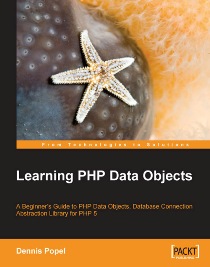Learning PHP Data Objects
eBook Details:
- Paperback: 188 pages
- Publisher: WOW! eBook (August 30, 2007)
- Language: English
- ISBN-10: 1847192661
- ISBN-13: 978-1847192660
eBook Description:
Learning PHP Data Objects: A Beginner’s Guide to PHP Data Objects, Database Connection Abstraction Library for PHP 5
- An overview of PDO
- Creating a database and connecting to it
- Error Handling
- Advanced features
In Detail
PDO is lighter, faster, and more powerful than existing PHP data abstraction interfaces. PDO is a common interface to different databases that must be used with a database-specific PDO driver to access a particular database server: the PDO extension does not provide a database abstraction by itself; it doesn’t rewrite SQL, emulate missing database features, or perform any database functions using by itself. It performs the same role as other classic database abstraction layers such as ODBC and JDBC: it’s a query abstraction layer that abstracts the mechanism for accessing a database and manipulating the returned records; each database driver that implements the PDO interface can also expose database-specific features as regular extension functions. PDO ships with PHP 5.1, and is available as an extension for PHP 5.0; it requires the new object-oriented features of PHP 5, and cannot run with earlier versions of PHP.
This book will teach you how to use the PDO, including its advanced features. Readers need to be aware of the basics of data abstraction and should be familiar with PHP.
This book starts with an overview of PHP Data Objects (PDO), followed by getting started with PDO. Then it covers error handling, prepared statements, and handling rowsets, before covering advanced uses of PDO and an example of its use in an MVC application. Finally an appendix covers the new object-oriented features of PHP 5.
This book will guide you through the data layer abstraction objects in PHP.
What you will learn from this book :
This book covers:
- An overview of the technology
- Getting started with PDO
- Error handling, prepared statements, and handling rowsets
- Advanced features, like getting column metadata and setting connection parameters with examples
Chapter 1 gives an overview of PDO along with a few features like single interface for creating a connection, connection strings, uniform statement methods, and use of exceptions and a singe system of error codes.
Chapter 2 helps to get you started with PDO, by creating sample database and then by creating a connection object. It also introduces PDOStatement classes.
Chapter 3 deals with various error handling processes and their uses.
Chapter 4 is about prepared statements. It deals with using prepared statements without binding values, binding a variable and a parameter to a prepared statement, and using LOBs as streams.
Chapter 5 talks about handling rowsets. It covers different ways to retrieve multiple rows. Scrollable cursors, and MySQL unbuffered queries and closing the cursor along with multiple queries, and rowsets are also explained.
Chapter 6 talks about advanced uses of PDO, and includes setting connection parameters, transactions, and methods of PDO and PDOStatement class.
Chapter 7 gives an example where creation of the method part of MVC application is discussed.
Appendix explains the object-oriented features like inheritance, encapsulation, polymorphism, and exception handling.
Approach
This book describes the topic first and then gives step-by-step instructions on how to go about a particular example.
Who this book is written for
PHP developers who need to use PDO for data abstraction.
This book starts with an overview of PHP Data Objects (PDO), followed by getting started with PDO. Then it covers error handling, prepared statements, and handling rowsets, before covering advanced uses of PDO and an example of its use in an MVC application. Finally an appendix covers the new object-oriented features of PHP 5. This book will guide you through the data layer abstraction objects in PHP. PHP developers who need to use PDO for data abstraction.
About the Author
Dennis Popel is an experienced PHP/PHP5 developer currently working for an Australian web development company, Motive Media (www.motivemedia.com.au). Serving Sun Microsystems Australia, Luna Park Sydney, Alsco Holdings and Pine Solutions, amongst others, Dennis leads company development of proprietary, web-based, software solutions. In his spare time, he runs the onPHP5.com blog and works on an online RSS aggregator NewzMix. Dennis Popel has been developing with PHP for more than 5 years and is experienced in such fields as object-oriented design and MVC. Previously he has worked at Rapid Intelligence, another Australian-based web company, publisher of such popular titles as NationMaster.com, FactBites.com and Qwika.com. In the past, Dennis was developing proprietary Java applications. This book is devoted to all the people that introduced and guided me in this wonderful world of information technology.
[download id=”240″ format=”1″]
